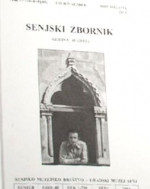Kultni kipovi iz Senja
Cult Sculptures from Senj
Author(s): Nenad CambiSubject(s): Archaeology, Regional Geography, Ancient World
Published by: Senjsko muzejsko društvo i Gradski muzej Senj
Keywords: Senj; Ante Glavičić; cult sculptures; Magna Mater; Diana; Liber; Serapis;
Summary/Abstract: The City of Senj, Croatian culture and science is immeasurable lost with the death of Ante Glavičić. This work is an expression of thanks for what he did for the city, the region and Senj Museum over many decades of persevering work. Several of Senj’s sculptures have great artistic value, along with the preserved inscriptions, they are also evidence of the distribution of religions and cults. Especially important are also the high quality heavily damaged marble statues of Magna Mater and one other goddess or personification which does not sit (like Magna Mater) on a throne but on a rock on which appear wild game and beasts (wild ox, bear and chamois). Therefore the sculpture probably does not depict Magna Mater. Here it is an assumption that it is the personification of the city of Senj which is surrounded by mountains and the sea. The find of the two sculptures close to one another means that it concerns sculptures from one shrine and that they are mutually compatible and complement each other. The marble head with a characteristic hair style is probably Diana, a cult which is attested to with two inscriptions. The epithet Diana Augusta which appears on both inscriptions indicates to the already Romanised emperor period meaning of the cult which has no direct connection with the Liburnian indigene religion. The headless character of Liber is also an iconic sculpture which is not so artistically valuable as the previous, but it is iconographical interesting because it is closer to local rather than classical Dionysian images. The cult of wine and enjoyment of wine is only indicated with the vine which winds around the tree, whilst the abundant fruit indicate to the general symbolism of fertility which is also very close to Liber. The sculpture of a seated Serapis is of very poor quality, but it is an indicator of the presence of a Hellenistic-Egyptian cult, and also probably of the bad financial status of those who worshipped it, because such a sculpture would have cost much less.
Journal: Senjski zbornik - prilozi za geografiju, etnologiju, gospodarstvo, povijest i kulturu
- Issue Year: 40/2013
- Issue No: 1
- Page Range: 195-208
- Page Count: 14
- Language: Croatian

